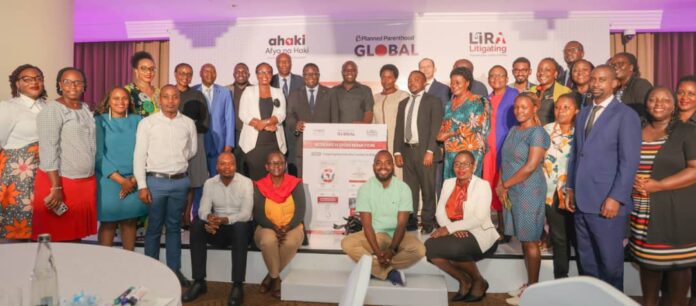By Trypheen Asimire
Kampala – Uganda’s judiciary has been urged to take a more proactive role in protecting maternal and reproductive health rights as the country struggles to reduce its maternal mortality rate.
At a national colloquium held in Kampala on Thursday, legal experts, government officials, and civil society leaders convened to emphasize the judiciary’s critical role in safeguarding these fundamental human rights. The event, organized by Afya na Haki, a leading advocate for reproductive justice in Uganda, ran under the theme “The Role of Courts in Advancing Maternal and Reproductive Health.”
Dr. Moses Mulumba, a legal expert, shared a moving case of Joyce Nakacwa, who died due to neglect and violation of her maternal health rights. He emphasized the need for collaboration between health and justice systems to prevent such tragedies.
“The courts, the judiciary, and the justice system can play a crucial role in ensuring that our health systems are much better than they are today,” Dr. Mulumba said.
Justice Cheborion Barishaki, a Court of Appeal judge, stressed the judiciary’s duty to hold governments accountable for providing maternal healthcare, a constitutional obligation.
“Our role as judges is not just to interpret laws but to ensure that these laws are applied in ways that protect the rights of the most vulnerable in our society,” Justice Barishaki emphasized.
Dr. Robert Mutumba, Assistant Commissioner of Health Services, acknowledged the contribution of civil society organizations in shaping Uganda’s healthcare delivery platforms. He emphasized the importance of multi-sector collaboration to address maternal health needs, recognizing that historically marginalized communities face significant barriers in accessing healthcare.
“The Ministry of Health has led efforts in understanding the burden of maternal mortality, and we have seen a significant reduction in maternal deaths through concerted efforts,” Dr. Mutumba said. “However, we still need to focus on reducing newborn deaths, which remain a significant concern.”
Minister of Justice and Constitutional Affairs, Norbert Mao, emphasized the complex power dynamics within the judiciary and the need for careful navigation to ensure independence, impartiality, and commitment to justice. He cited the landmark case of Roe v. Wade, which shaped reproductive rights in the United States.
“The judiciary must be mindful of its role in protecting the rights of marginalized communities, including women and girls, and ensure that the law is applied in a way that promotes reproductive justice,” Minister Mao said.
The colloquium aimed to comprehend the role of courts in advancing maternal and reproductive health, track progress, equip stakeholders with knowledge on reproductive justice, and disseminate knowledge products.
Maternal and reproductive health remains a significant concern globally, with an estimated 287,000 maternal deaths occurring worldwide in 2020. Sub-Saharan Africa accounts for 70% of these deaths, with a maternal mortality ratio (MMR) of 545 per 100,000 live births. In Uganda, the MMR stands at 189 per 100,000 live births, with uneven progress and pockets of high maternal mortality rates in urban areas like Kampala.


